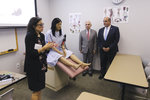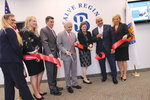By JOHN HOWELL Senator Jack Reed stepped back into the classroom Tuesday and met Anne. At first she didn't say anything. In fact, she was lifeless. She didn't as much as blink and there was nothing like a heartbeat. She was sitting upright and looked
This item is available in full to subscribers.
We have recently launched a new and improved website. To continue reading, you will need to either log into your subscriber account, or purchase a new subscription.
If you are a current print subscriber, you can set up a free website account by clicking here.
Otherwise, click here to view your options for subscribing.
Please log in to continue |
|


Senator Jack Reed stepped back into the classroom Tuesday and met Anne.
At first she didn’t say anything. In fact, she was lifeless. She didn’t as much as blink and there was nothing like a heartbeat. She was sitting upright and looked straight ahead and paid no attention whatsoever to Reed, Mayor Joseph Solomon or Kelli Armstrong, the president of Salve Regina University. They would have been statues for all she cared.
She would be meeting students in the Master of Science in Nursing program based at Salve’s Center for Adult Education on Metro Center Boulevard, for the first time that evening. Neither Reed nor anyone else attending a ribbon cutting ceremony at the center took offense at Anne’s silence. They really hadn’t expected she would say anything.
That wasn’t the case, however. At the hands of Dr. Sharon Stager, director of the MSN program, who donned a headset with microphone, Anne – who will give students the chance to respond to diagnose and then respond to simulated conditions from a heart attack to a bowel blockage – came to life. She was open for questions from everything to “how do you feel today” to Reed’s inquiry as to what she thought of politics.
Anne, Stager and the advanced practice nursing lab didn’t steal the show. They had some competition from Dr. Judith Drew, director of the M.A. program in clinical rehabilitation and mental health counseling, and adjunct faculty member Jeff Mace of the administration of justice and cybersecurity program.
The ribbon cutting ceremony, coordinated by the Central Rhode Island Chamber of Commerce and the city’s department of tourism and development, put a spotlight on the center’s new Digital Forensics and Advanced Practice Nursing labs and the university that has had a Warwick presence since 2012.
Reed congratulated Salve for “stepping up the game” and bringing hands-on learning. “This is the way to the future.” He sees the university as a link to giving Rhode Island the best skilled workforce in the nation.
“I am confident with Salve in the lead that work will be done,” he said.
Reed rhetorically asked why he was taking part in a ribbon cutting – multiple scissors were provided so multiple officials shared the honor – for Salve. He said the parochial school he attended from grades 1 through 8 was run by the Sisters of Mercy and when they ask, “you have to go.”
Armstrong, the eighth president of the university based in Newport, said the center for adult education is designed to be “nimble.” In addition to graduation degree programs, the center offers classes in administration of justice and cybersecurity, health care administration, psychology and holistic counseling.
As Mayor Solomon noted in his welcoming comments, many members of the Warwick Police Department have taken classes at the center and the city is better off as a result.
Evident as the group toured the seven-classroom center was the absence of students.
Dr. Tobias Stapleton, Dean of Graduate Studies and Continuing Education, had the explanation. Most of the 150 students taking classes at the center have daytime jobs. Classes are held in the evening hours, occasionally going as late as 9 p.m. as well as online.
Drew said the center gives the university a centrally located presence in the state and access to affordable education without having to cross the bridge. She said students range in age from their mid-20s to their mid-50s. She put tuition cost at $600 per credit hour, noting that unlike some other institutions there are no student fees for amenities that students may have no interest in using. Classes and programs are small, affording students more one-on-one contact with teachers. In the clinical rehabilitation program there are a total of 43 students, she said. She said the size makes for a sense of community.
Devoted to technical, hands-on work using both computers and mobile devices, the Digital Forensics Lab leverages Salve Regina’s academic partnership with Cellebrite. Salve Regina students have the opportunity to receive both Cellebrite Certified Operator (CCO) and Cellebrite Certified Physical Analyst (CCPA) certification, applicable to both public and private sector investigations.
Salve Regina’s nursing programs are dedicated to elevating the art of caring for individuals seeking health care. Using the new lab, didactic learning is combined with crucial skills practice to enhance patient care best practices. The Advanced Practice Nursing Lab simulates a clinical environment; through patient-care simulations, students develop confidence and practice critical thinking skills.
Comments
No comments on this item Please log in to comment by clicking here